She Meets Him at the Bagels — He Installs Spyware; She Finds a Studio and Reclaims Her Life
It started with a bagel. A cinnamon raisin bagel, to be exact. Warm, soft, and innocent enough to make the irony sting later. The stranger was standing at the counter in front of me, debating cream cheese flavours with the kind of confidence that people who laugh easily tend to have. I laughed too. But I did not know why.

Source: UGC
Maybe it was the way he asked the attendant, "Do you ever get tired of people who can't decide?" Or it was because I had not laughed freely in months.
We met eyes for less than a minute, long enough for me to feel visible again. It was nothing, just small talk about bagels and bad Mondays. When he left, I felt lighter, but I couldn't explain why.
That evening, my husband, Tunde, noticed the smile I carried home. "You're glowing," he said, half-laughing, half-watching.
I brushed it off, blaming the office happy hour. But my husband's eyes lingered too long, and something inside me tightened.
Two days later, he went through my phone.
When I found him scrolling through my chats, I froze. He said he was "just checking something." I told him he would find nothing. He didn't believe me.
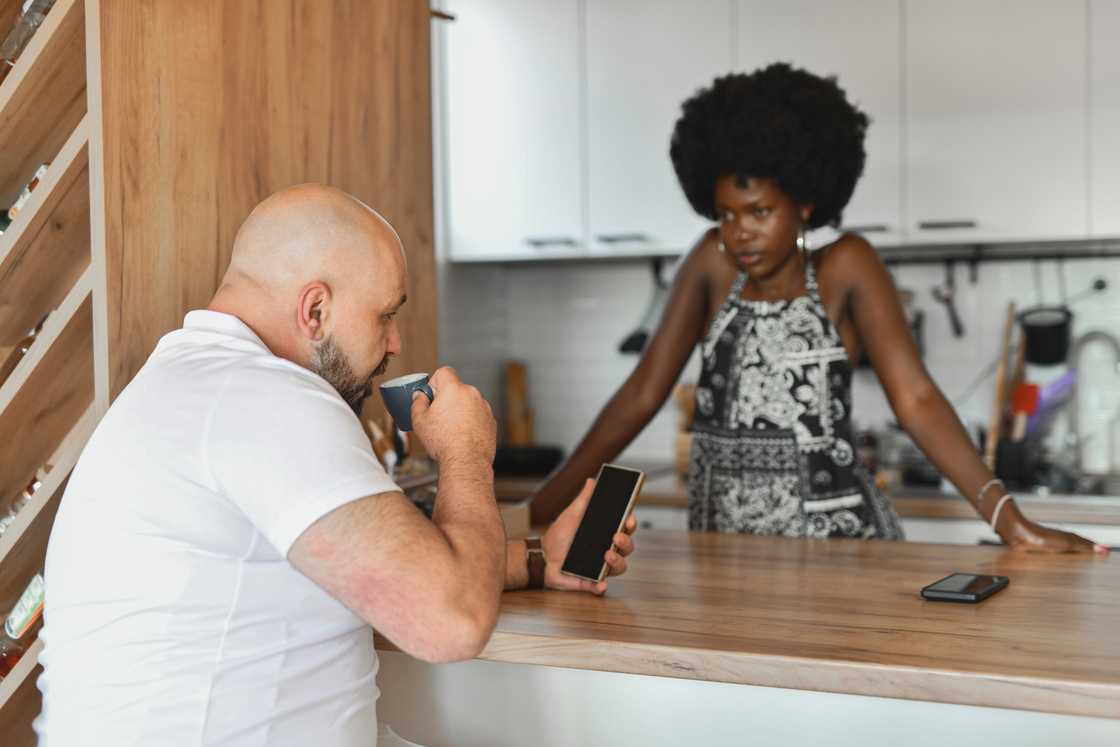
Source: Getty Images
The argument stretched into the morning, spilling into work calls and missed breakfast. Tunde accused, and I defended. He shouted, and I cried.
By night, he apologised as always: flowers, soft voice, careful words.
But this time, I didn't melt. I kept seeing the bagel shop, the moment of laughter, the small flicker of myself that had briefly returned.
I realised that the problem was not another man. The problem was that I had forgotten who I was before all this noise.
And that realisation terrified him more than any affair ever could.
When I married Tunde, I thought I had won the quiet kind of love. It was stable, steady, and protective. He was attentive, almost to a fault. He called every hour, insisted on driving me everywhere, and always wanted to "keep me safe."

Read also
My Grandma Fell and Lay Alone for Two Days — Until Her Neighbours Found Her and Saved Her Life
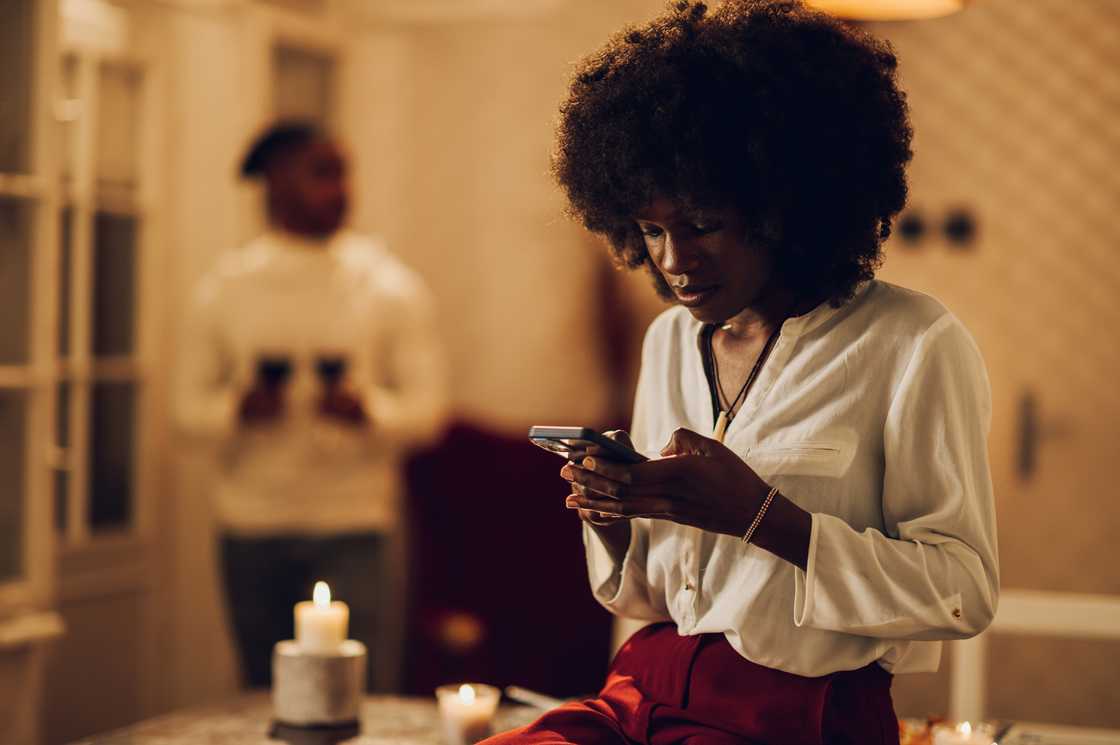
Source: Getty Images
At first, I mistook control for care. It felt nice to be wanted so completely. But soon, care became surveillance. Tunde noticed everything: who texted me, what I wore, and how long I stayed at work.
If I stayed out with friends, his tone would harden. "You didn't tell me you'd be late."
When I said I lost track of time, he would reply, "You always lose track when I'm not there."
Our fights became regular. Apologies too. I learned how to walk on eggshells, with soft words, a quiet tone, and perfect timing. Tunde would hug me after every argument, whispering, "You know I just love you too much."
I told myself that jealousy was proof of passion. That control was protection. That this was what marriage looked like when you loved deeply.
But I started disappearing inside it.

Source: Getty Images
I stopped wearing lipstick because it "attracted attention." I turned down work trips because he didn't like me travelling alone. I even deleted my male colleagues' numbers: anything to keep the peace.

Read also
UK-Based Nigerian woman accuses authorities of negligence as leaking ceiling falls on son’s head
One night, he made a scene at a restaurant because a waiter smiled at me while pouring wine. The next morning, he brought breakfast to bed and said, "I'm sorry. You know I can't stand the thought of losing you."
I laughed it off for years, calling it devotion. But it wasn't. It was fear disguised as love.
When my friends invited me to office events, I always declined. That Friday, I went only because my boss insisted. "It's good for visibility," she said.
At the happy hour, between music and chatter, I felt something I had forgotten existed: ease. I spoke freely, laughed too loudly, and danced without apology.
That was when I met the man at the bagel counter. It wasn't romance. It was recognition of the version of myself I had buried under Tunde's control.
And it was enough to set everything on fire.

Source: Getty Images
Tunde saw the change immediately.
"Who did you meet?" he asked one night, without warning.
"No one," I said.
"Then why are you happy?"
The question hung in the air like a verdict. I laughed nervously, pretending not to notice the edge in Tunde's voice. But his eyes didn't soften. They never did when he thought I was hiding something.
That night, while I showered, he went through my phone. When I came out, steam still clinging to my skin, he was sitting on the bed, scrolling.
"What are you doing?"
"Checking," he said flatly.
"For what?"
"For lies."
I reached for my phone, but he pulled it away from me. "Why do you have a message from Kunle?"
"He's my colleague."
"Since when do colleagues send emojis?"
"It was a thumbs-up, Tunde."

Source: Getty Images
He threw the phone on the bed. "You think I'm stupid?"
I stood there, towel dripping, heart racing. "You're paranoid."
He shouted. I shouted back. Then came silence; the dangerous kind. He stormed out, slamming the door hard enough to rattle the mirror.
The next morning, he acted as if nothing had happened. He made breakfast, poured me juice, and even kissed my forehead. "Let's forget last night," he said. But I couldn't.
Two days later, he installed a tracker app "for emergencies." I deleted it. He reinstalled it.
Every attempt to reclaim my space became proof that I had something to hide.
He started timing my errands. If I went to the supermarket, he would call twice. If I didn't pick up, he would show up at the parking lot.

Read also
“Maybe I got it wrong”: Tiwa Savage finally addresses backlash from her ‘second wife’ statement
Once, he appeared outside my office unannounced. "Just checking on you," he said with a forced smile. My colleagues laughed awkwardly, thinking it was sweet. I smiled too, pretending not to feel trapped.
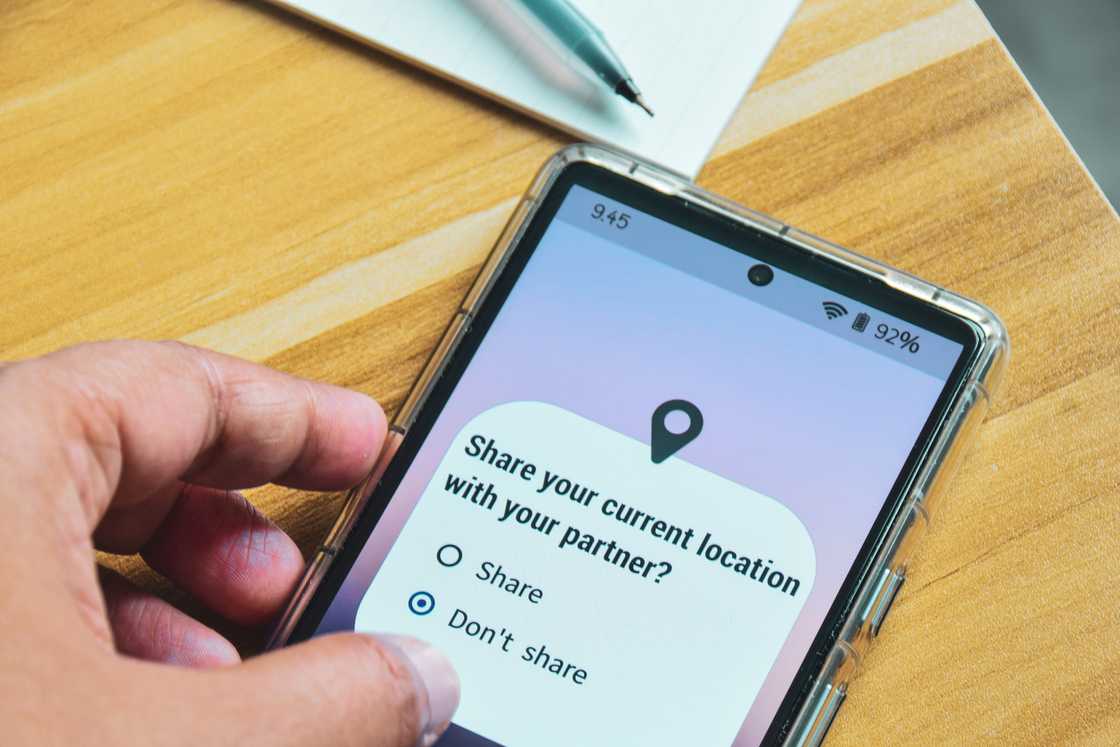
Source: Getty Images
The control seeped into everything. If my phone battery died, it meant I was lying. If I wore perfume, it meant I was trying to impress someone. Even laughter became suspicious.
One night, during another argument, he grabbed my arm so tightly that I winced. "You are mine," he said through clenched teeth. "You don't get to make me look like a fool."
I froze. I wanted to scream, but the words got stuck in my throat.
After that night, I started sleeping with my phone under my pillow; not to hide messages, but to protect peace.
When I finally mentioned therapy, he laughed. "You think you're crazy?"
"No. I think we need help."
He scoffed. "You just want someone to tell you I'm the problem."
The following week, I stopped arguing. I said yes when Tunde ranted, smiled when he sulked, and nodded when he lectured. I became small, agreeable, invisible.

Source: Getty Images
But one night, while brushing my hair, I saw myself in the mirror and didn't recognise the woman staring back. Her eyes looked tired, her shoulders slumped as if she was carrying a secret too heavy to name.
That same week, I went back to the bagel shop. But not for the stranger, but for clarity.
The man wasn't there, and that was fine. I sat alone, ordered tea, and wrote.
I wrote a letter, not to him, but through him, about everything I wanted and had been too afraid to name: freedom, laughter, and peace that didn't need permission.
I didn't send it. I just folded it neatly, placed it in my bag, and exhaled silently.
For the first time in years, I felt something shift inside me. It wasn't a rebellion. It was a recovery.
And that was the beginning of my escape.
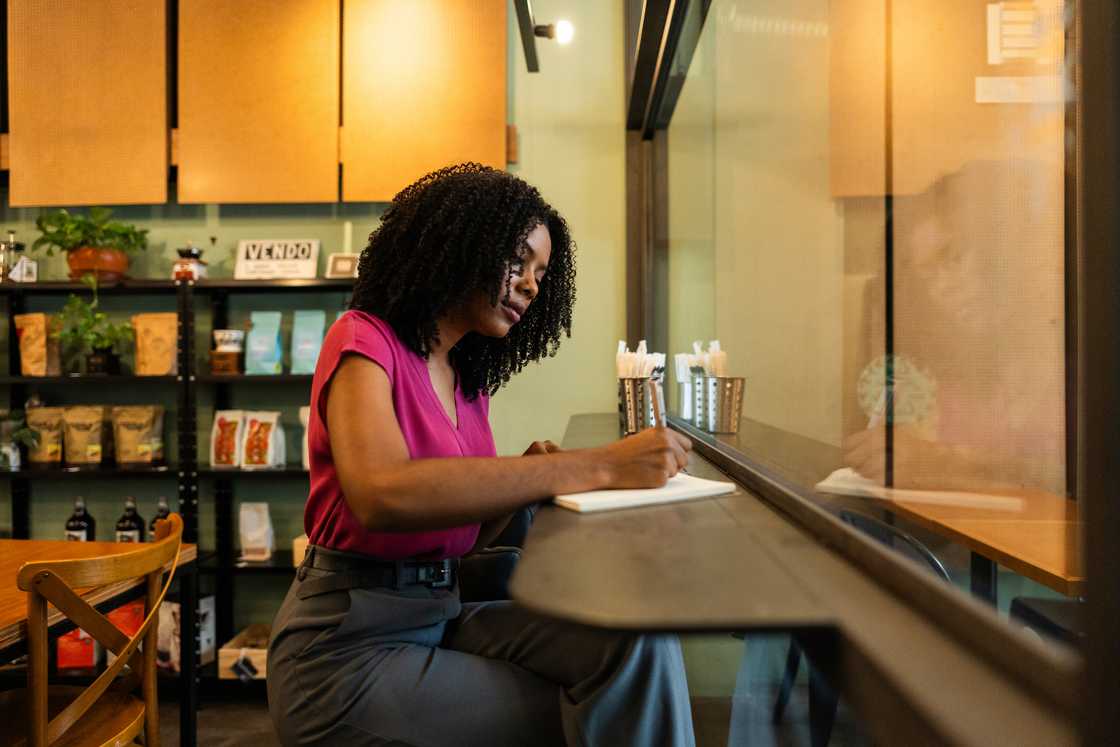
Source: Getty Images
He found the letter, folded neatly inside my journal. He must have read it while I was at work.

Read also
"I'm suffering": Air India sole survivor cries out in pain months after plane crash that killed 241
When I returned, he stood in the living room holding the pages like evidence.
"Who is this for?" he asked.
"No one," I said quietly.
He threw the papers on the floor. "You write love letters now?"
"It's not what you think."
"Then explain."
"It's a letter to myself."
He laughed, cold and sharp. "You think I'm an idiot?"
His voice rose, his hands shaking. I stood still. "It's therapy homework," I said. "My therapist told me to write it."
That stopped him. "You're seeing a therapist?"
"Yes."
"For what? To destroy our marriage?"
"No, Tunde. To save myself."
The silence that followed was louder than his shouting had ever been.

Source: Getty Images
He dropped the papers and left. When he came back hours later, he didn't apologise. He just said, "So you've chosen strangers over your husband."
I didn't answer. Because this time, Tunde was right.
Therapy became my refuge. I spoke about control, fear, and guilt. My therapist helped me name things I had normalised: emotional abuse, manipulation, coercive love. She said something that changed everything: "You can't heal in the same space that breaks you."
I went home that night and packed a small suitcase.
When Tunde asked where I was going, I said, "To safety."
He didn't stop me. Maybe he thought I would return. But I didn't.
I moved into a small studio apartment in Yaba. It wasn't fancy, but it was mine.
The first night, I couldn't sleep. The silence felt too wide. There were no footsteps, no checking, no arguments, just space.

Source: Getty Images
I lit a candle and prayed, not for revenge, but for peace.
The next day, I mailed a letter to myself. I wanted it to arrive like a contract, a promise from the woman I was to the woman I was becoming.
Weeks passed. Therapy continued. I learned to eat alone without guilt, to wake without anxiety, to walk through markets without watching my phone for constant texts.
Sometimes, I caught myself reaching for him out of habit; the way you might try to touch a bruise that isn't there anymore.
He sent messages, apologies mixed with accusations. "You've changed." "You'll regret this." "Come home."
I didn't reply. Healing required silence.
A few months later, the letter arrived, neatly stamped and creased from travel. I opened it at my kitchen table and read every word slowly. It no longer sounded desperate. It sounded alive.

Source: Getty Images
In therapy, I told my counsellor that I felt like I was finally exhaling after holding my breath for years. She smiled and said, "Freedom feels like oxygen."
I started singing again. Literally by joining a small choir at church, something I hadn't done since university. The first time I sang in public, my voice shook, but it was mine.
I also learned to laugh without apologising for the volume. To say no without guilt. To trust my own timing.
Tunde eventually stopped calling. I heard from a mutual friend that he had started dating again. I wished him well.
I had no hatred left; Only clarity.
I understood now that love without respect is just possession wearing perfume.
Looking back, I realise the real villain was not a person, but control. The kind that hides behind "I love you" and calls fear devotion.

Source: Getty Images
I used to believe that strength and endurance were the same. That good wives forgave everything. That love meant losing parts of yourself for the sake of peace.
But peace bought with silence is not peace. It is surrender.
The man at the bagel shop was never the story. He was the spark that showed me how small my world had become. His kindness reminded me that life could still feel light. That laughter was not a betrayal.
Therapy did not fix me; it helped me find myself. It taught me that healing does not mean hatred. It means choosing truth over comfort, freedom over fear, and self-respect over approval.
I used to measure love by what I could endure. Now I measure it by how safe I feel.
When people ask why I left, I say, "Because staying would have cost my soul."
Sometimes, the bravest thing you can do is disappoint someone who benefits from your silence.
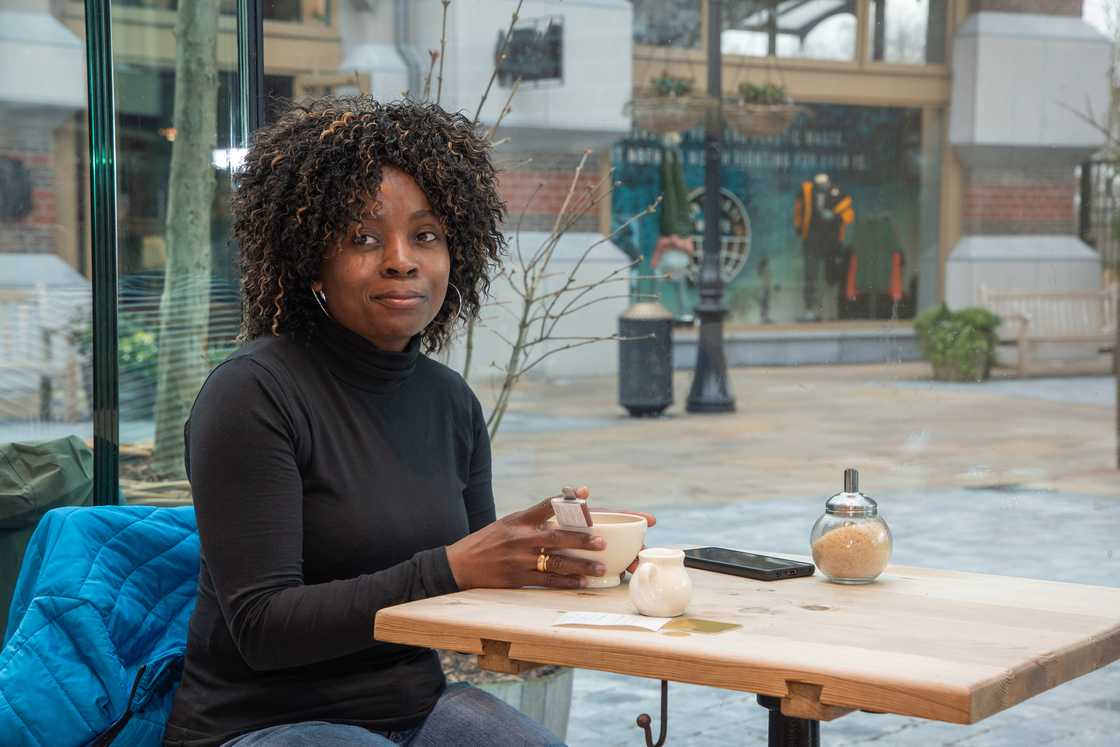
Source: Getty Images
Today, I still pass by that bagel shop. I stop for tea, sometimes bagels, sometimes nothing at all. I sit by the window and watch people laugh, rush, and live their lives. I think of that one random moment that changed everything, not because I met someone new, but because I finally met myself again.
So I ask you, reader: when was the last time you listened to the part of you that whispered, enough?
And when it comes again, will you hush it for comfort, or follow it toward freedom?
Because sometimes, healing begins not with a door slammed shut, but with a quiet decision to stop hiding your own voice.
This story is inspired by the real experiences of our readers. We believe that every story carries a lesson that can bring light to others. To protect everyone's privacy, our editors may change names, locations, and certain details while keeping the heart of the story true. Images are for illustration only. If you'd like to share your own experience, please contact us via email.
Source: YEN.com.gh








